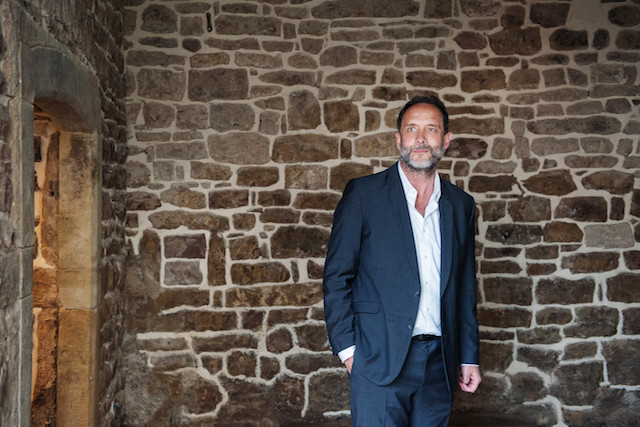Throughout the year, Celebrating Luxembourg profiles the people who contribute positively to the grand duchy’s international reputation.
Natalie Gerhardstein: Can you sum up in a few sentences what you do for a living?
Carlo Hein: I’ve been working in our family business in sustainable real estate since 1996. We’ve built up renewable energy in Luxembourg, including the first wind farm and solar park, and some service companies related to renewable energy and real estate. I also have a company producing Luxembourg cider.
If you could highlight three major dates in your life, what would they be?
Joining the family business in October 1996 marked me. After completing my education, having my experience in other companies, I really wanted to join [my family business] and become an entrepreneur. Another special date is spring 1997, the inauguration of our first wind farm in Mompach because it was a project completed by the second generation of the family. It was something completely new and was in renewable energy, something we could be proud of. The third date will be 16 June 2017, the launch of the Ramborn Cider Haff [a centre devoted to Luxembourg apples and cider making]. My family, the Ramborn team and farmers and community in Born all supported the centre, and it will be a beautiful date because I was born in Born, and my family and neighbours will come together to celebrate in my native village.
If someone said that you were a shining ambassador for Luxembourg, how would you take that?
The best ambassador is the cider itself! There’s a real history to it. When I get together with people, I present Luxembourg by describing the history of apples and cider. There’s a lot we have discovered about it, and it seems like everyone has an apple story or memories in their family--people within Luxembourg, but also outside of the country. Having a cider with others means sharing history, family history, and simply the love of a good drink.
Carlo Hein’s passion for apple and cider making are due in part to his youth, much of which he spent in the orchards in his hometown, Born, along the Sauer River. Photo: Ramborn
Would you have followed the same career path if you were not living in Luxembourg? In what way has the country enabled you to pursue the career you have?
With regards to education and family, I would have definitely followed the entrepreneurial path. I’m sure things would have been different if I’d gone to Germany or the US. Here in Luxembourg you have the advantages and challenges of being in a small country. The advantage is that you have a great network, but the disadvantage is that you’re quickly at the borders and then have to enter other markets, working together with other people from all over the world. At the beginning that can seem like a challenge, but you soon realise it’s a huge opportunity because you get input from all over the world. Luxembourg entrepreneurs are in contact with so many [people] worldwide, and that’s one of the keys to success for Luxembourg.
How has Luxembourg society evolved during the last 20 years?
I would say it has evolved over the last centuries. Today we might think that we are living in challenging times, but we’ve been lucky to have an open society in a very peaceful time--it’s important to remember that. The last century, with its two world wars, brought more challenging times than anything we are experiencing today.
What does it mean to be Luxembourgish?
I love that question because for me it means if there’s ever a football championship, you have to decide which other team to root for since there’s very seldom a Luxembourg team making it that far! And if ever there is a Luxembourg team in it, then we go nuts! The streets are empty. But it happens so rarely… But it’s fun to get together with your family with each person supporting a different team from somewhere else in the world, whether because they have studied there or have a relative or other connections to the place. My wife is Icelandic, so it’s normal that during the last European championship I was for the Icelandic football team, of course!
Being Luxembourgish also means you need to go outside the country to progress and connect. I went to a cider academy in the UK, but then it’s nice to come home and take what you’ve learned outside and applying it inside.
Where is your favourite/secret place in Luxembourg?
I have two. I love the Sauer River: I spent my youth more in the river than I studied. I also love the orchards of Born. I spent a lot of time helping in the orchards, harvesting apples and making apple juice. Those were special moments, and even the smell of an orchard is something you never forget.
Do you feel there is a real national identity? Is it threatened by the evolving demography and the fact that the foreign population is growing?
It’s a huge advantage for Luxembourg that we have so many people here and can learn from each other. Look at the history and how much has happened to Luxembourg over the centuries: in each century another person or culture brought something with them, from the casemates to the Napoleonic Code, which made us richer in knowledge and culture… and that’s actually happening again today. Diversity makes us richer. And if we as Luxembourgers would see a threat in that, then that’s the only threat I see.
Celebrating Luxembourg
In 2017 Maison Moderne and Nvision celebrate Luxembourg by profiling 100 people who contribute positively to the country’s international reputation and brand image. The series will culminate in a gala evening on 13 December at Luxembourg Congrès. If you know somebody who you think deserves to be on the 100 list, let us know: [email protected].

